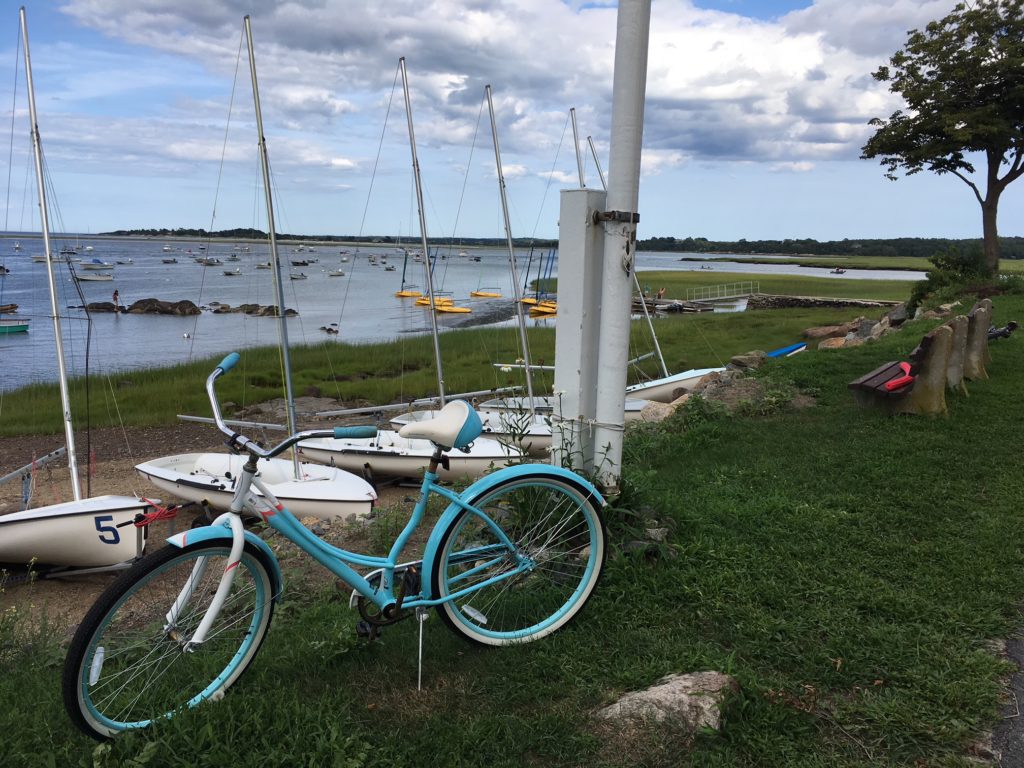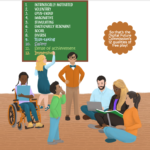
I spent the last week leaning heavily in the direction of outdoor species. I stepped back from the internet (email, FB, news, podcasts, videos, etc.), and used my phone as a camera and photo sharing device to share moments from my week with dear friends at home via short, infrequent texts. Most of the time, the phone was in airplane mode.
A parent friend, just back from a vacation with her kids, wrote me about her trip: “Lots of adventuring. I went offline, too, which was magical. Must do that more.”
Must do that more. Can’t say it better. The experience has me thinking deeply about how to design a more nurturing relationship with my digital life as I reenter the electronic swirl. I find myself unsubscribing from several dozen newsletters, bringing a new level of discrimination to what I give my time to. I’m not doing the usual mixed media multitasking I typically did before I unplugged. I’m appreciating quiet. I can feel the pull to old patterns but I notice I am able to choose differently when the pull to click arises. For now.
I’ve written about Delaney Ruston and Tech Talk Tuesdays in previous posts (here and here—give these a read or even a reread). Continuing on my unplugged theme this week…in her newest blog post, Delaney writes about her 16-year-old daughter Tessa’s return from camp after being unplugged for a few weeks. On her return, Tessa started a conversation sharing some of her goals for the rest of the summer and created a plan “to watch no more than 4 hours a week of TV-type shows and spend just an hour a day on social media.” Sounds like Tessa and I had similar responses after being unplugged—we both chose to reclaim some of our time from too-easy-scrolling for more intentional activity.
If you’ve been reading Mindful Digital Life for a while now, you know that I write a lot about developing our skillfulness in talking about how we’re living with technology. In this post, Delaney shares how essential it is to get comfortable talking with other parents about how you’re working with technology in your family.
She writes:
…what I have learned is how incredibly helpful it is—for the sake of our children and teens—that we speak up and share the solutions we are trying. There are no chapters in What to Expect When You’re Expecting on how to parent during a technology revolution. We need each other.
And then she shares examples of how 15 parents and their kids are structuring their summer time in the digital realm. It’s worth the one minute it will take you to click this link and read her post.
Personally, I like to encourage parents to abandon the “screentime” metaphor for more specific conversation. For example, when working as a family to design a technology plan for a weeklong experiment, you might try posing a few questions to each other:
- What kind of content would you most enjoy interacting with this week when you use your device (phone, tablet, laptop, desktop, voice assistant, game console, etc.)? Why?
- How long would be optimal to spend on it? Why not more or less?
- How can you help yourself unplug when the optimal time you selected is up?
- What kind of new content would you like to seek out to expand your comfort/habit zone this week?
- What kind of content or platforms would you most like to reduce or avoid this week? Talk about why and how you can help each other meet your goals.
- Add your own questions…
Here’s an invitation: Write me and let me know how it goes. If you’d like, I’ll schedule a video conversation with you to discuss. I’d love to hear what you discover.

What I’m reading: You might have noticed an article by Jean M. Twenge in the September 2017 issue of The Atlantic…it was one of those viral articles spreading from Facebook feed to Facebook feed with a dramatic, clickable title: “Have Smartphones Destroyed a Generation.” I was happy to discover this thoughtful critique of Twenge’s article by Vicky Rideout, posted to The London School of Economics and Political Science website, in their website category, Parenting for a Digital Future. I encourage you to read it.
And then follow it up with another response to Twenge by Lisa Guernsey in Slate titled “Don’t Take Away Your Teen’s Phone.” Guernsey writes:
I suspect that we parents feel trapped because the solution seems so binary. It’s as if there are just two paths to take here. There’s the laissez faire route: “Don’t worry about it, kids are kids, at least they’re not doing drugs, let me get back to my own phone.” Or there’s the impossible one: Wrench those phones out of your teens’ hands and tell them to go straight back to 1985, right now, no backtalk.
Neither of these seems terribly promising. Finding a third way will require keeping a level head about the limitations of the research (more on that in a moment). But it may also mean really talking to our teens.
In the rest of the article, she writes about her conversation with her 15-year-old daughter, Janelle, who read the Twenge article with her mother. We need to hear from teens more often in the media—so thank you, Lisa Guernsey and Janelle. Guernsey’s writing is very insightful—and a great example of growing the skill of talking with each other about technology and well-being.
~John Muir, My First Summer in the Sierra


